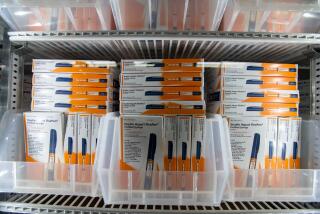Probe Reveals Illegal Manufacturing of Generics, Lawmakers Say : Drug Firms’ Bribery Held ‘Tip of Iceberg’
- Share via
WASHINGTON — Two generic drug companies already immersed in bribery charges have more pervasive problems than originally thought, and the companies likely will be investigated by the Justice Department’s criminal division, two key members of Congress say in documents to be made public today.
An admitted bribery payment to Food and Drug Administration employees “appears to be only the tip of the iceberg in a story . . . rife with problems,” according to statements by Reps. John D. Dingell (D-Mich.) and Thomas J. Bliley Jr. (R-Va.). Dingell is chairman of the House Energy and Commerce Committee and its subcommittee on oversight and investigations, while Bliley is the subcommittee’s ranking Republican.
The congressmen say their subcommittee investigation of the two companies and the FDA revealed incidents of fraud and “an attempted cover-up of illegal manufacturing practices.” They further charge that current top officers “attempted to mislead” subcommittee investigators.
The charges against Par Pharmaceuticals Inc. and its subsidiary, Quad Pharmaceuticals, are expected to be detailed today in a hearing by the subcommittee.
Guilty Pleas
The companies and two former top officials have already pleaded guilty to paying off three FDA employees in an attempt to gain speedier approval of their generic drugs. Dilip Shah, a founder and former president of Quad, is scheduled to be sentenced Wednesday in U.S. District Court in Baltimore. Ashok Patel, a founder and former senior vice president of Par, is scheduled to be sentenced in October.
Dingell and Bliley told the sentencing judge that the company continues to give only “grudging and limited” cooperation to the subcommittee. In a letter and memo sent Friday to U.S. District Judge John R. Hargrove, the congressmen also said that the current top officers of the corporation “attempted to mislead” congressional investigators “by representing that only two employees out of the thousand employees in both companies had been engaged in wrongdoing. . . . That is simply not true.”
The memo also states that the two current top officers of the corporation--Perry Levine, president, and Jeff Levine, executive vice president--either knew or should have known that the corporation violated federal laws regulating the drug industry. Dingell and Bliley said these violations included:
--”Unapproved deviations” in manufacturing equipment and procedures.
--”Destruction or suppression” of evidence and records requested by FDA investigators.
--Switches in drug samples that were undergoing tests, and changing formulas after they had been submitted for study.
--Other unapproved alterations in the chemical formulation of drugs.
--Unapproved changes in manufacturing sites.
--Changes and alterations in record-keeping procedures.
“Any claim of honest ignorance on the part of . . . management is completely disingenuous,” the congressmen said.
Ignored Problems
Dingell and Bliley charge that corporate officers “failed to conduct any investigation of problems” even after they were informed of Shah’s involvement with illegal payoffs to FDA employees. Further, they say, these same officials continued to delay action after the FDA presented them with evidence of false statements made by the company in their applications for drug approval.
The Levines initially told the subcommittee “that all illegality at the firm was limited to the activities of two employees,” Patel and Shah, the lawmakers say.
Nevertheless, they say, “by the end of the same week” Par’s attorneys told the subcommittee that Jeff Levine “may have been aware of the deliberate suppression of evidence” by another of the firm’s founders.
Par and Quad officials could not be reached for comment Sunday.
The generic drug industry has been the subject of a widening federal probe by both the House subcommittee and the U.S. attorney in Baltimore.
Under the charges already brought, Shah and Patel could each receive a maximum of two years in prison and a $250,000 fine, and each of the corporations could be fined a maximum of $500,000.
More to Read
Get the L.A. Times Politics newsletter
Deeply reported insights into legislation, politics and policy from Sacramento, Washington and beyond. In your inbox twice per week.
You may occasionally receive promotional content from the Los Angeles Times.










